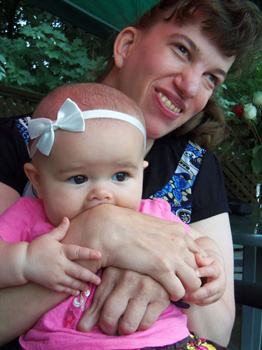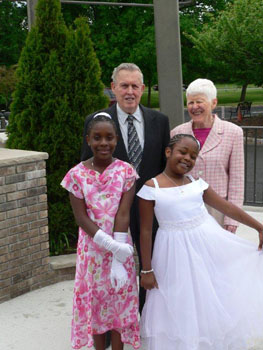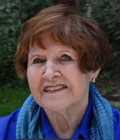Definitions
Birth Defect: "Abnormalities of structure, function or body metabolism that are present at birth. Major defects are abnormalities that lead to developmental or physical disabilities..."*2
Disability means: "Having a physical or mental health condition or a health problem that restricts their ability to engage in activities of daily living." *3 According to the U.S. Centers for Disease Control and Prevention, "About one in every 33 babies is born with a birth defect." *4 "Birth defects can be caused by genetic, environmental, or unknown factors. Most babies with birth defects are born to two parents with no health problems or risk factors..." *2 For a list of birth defects refer to *2. For advice to prevent birth defects: Birth Defects in CDC website
Literature
How parents and siblings and the child with a disability react to the family situation.
Parents'reactions: Kandel and Merrick have complied results from studies about families having a child with a disability. The birth of such a child usually follows five stages: "denial, anger, bargaining, depression and acceptance." Parents usually react with "psychological stress, a feeling of loss and low self-esteem." The child is "disappointing" and a "social obstacle" leading to shame and embarrassment." Parents may direct their anger toward others, their partner, the physician, or other families who do not have this stress. Some parents bargain with their higher power: e.g. If you heal my child of the disability, I'll quit drinking or... They may feel guilt, that the child is a punishment for a past sin. They may overly protect this child who is a symbol of their failure. The frustrations of finding specialized help, managing added costs of care, maintaining social communications may mean that the parents aren't able to communicate with each other. It is usually the mother who assumes more responsibility, so that the father often feels neglected by his wife who is busy with the child. A report concerning Down syndrome in Israel found that 25% of families abandon the child in the hospital. One United State study found that "the divorce rate was ten times larger in families with a disabled child than in the general population." Whether the child is placed in an institution or kept at home the grief of the loss of an expected normal child is a life-long "chronic sorrow." Parents need to talk with a competent professional about their reactions and strategies for coping. *5
Sibling reactions: Gretchen Cook and others report that siblings of children with disabilities need a place to vent their feelings and help them cope with the family situation. Siblings often report that they are ashamed or embarrassed by their sibling with a disability and don't have the words to explain to their pals why their sibling is different. They often feel guilty for having those aversions, feel that they don't deserve to have friends or a successful life, and even wish that they be punished with a disability. They often report that they feel neglected because their parents are overburdened with care for their sibling. They may worry that they could "catch" the condition or that they carry the gene so that their children will be disabled. They may resent the extra burden of caring for the brother or sister, which is placed on them at an early age and worry that they may have to take over long-term care. On the other hand those children who have open communication with their parents were better at establishing relationships with friends. Later in life the sibling often feels that he/she benefitted because of the responsibility placed on them--they feel they understand that people are different and that they have learned how to manage difficult situations. *5 *6
Children's reactions: People having a disability do not want to be labelled: e.g. the blind girl. They want to be known as an individual and to share experiences with others based on like interests. They want opportunities to be independent and to have access to transportation, jobs, and socialization. When they receive love and respect they develop self-assurance, which makes it easier for others to know them. *1
Case study, Jessica
Jessica is a young lady with an out-going, friendly personality who is now 36 years old. Although she has cerebral palsy and aphasia, has limited use of her hands and arms, no use of her legs and has grand mal seizures, she has lived with her parents, and with their management lives an active life. Nancy, her mother, described frequent bouts of contractions during her pregnancy, which were later believed to be the body's reaction to expelling a twin that had died. Jessica was six weeks premature when she was born in the labour room. Such a small baby would need oxygen, but none was available in the labour facility. The attending doctor had thought that Nancy's labour would be long based on her first pregnancy seven years before and didn't move her to the delivery suite.
The parents began to suspect some disability when Jessica couldn't sit or stand at the usual age, however their doctor attributed the lack of maturity to Jessica's early birth and assured them that Jessica would catch up. Finally when Jessica was eighteen months old their doctor sent them to the Ontario Crippled Children Center where the diagnosis was made. The medical director advised them to put Jessica into an institution, saying that they would not be able to care for a child with so many disabilities. He advised them to sue the physician and hospital attending her birth "because it is going to be a financial hardship for you to take care of her." Nancy and her husband rejected that suggestion, believing that it would signal to Jessica that she was an unwanted burden.
From the earliest days they invited other children to attend extravagant parties so that Jessica could socialize: bowling parties, clown parties, horse-back riding and three wheel tricycle experiences with friends. They campaigned to have her admitted to a regular school rather than to a specialty school with handicapped children. Having achieved that right, her parents found it difficult to locate a school that would take her. This was before the days when Ontario schools employed assistants to help children with special needs, so Nancy was obliged to drive Jessica long distances and to return at mid-day to take Jessica to the bathroom. Jessica developed language skills based on the Bliss Symbolic (International) System, which uses pictures and one hand sign language.
"How did your family function," I asked Nancy.
"Like any family. The mother is expected to take care of the meals, the laundry and look after the children. I had no time of my own. I've always worked, but often I'd be called from the work site to look after Jessica. It was like we were attached at the hip."
"How does your older daughter feel about Jessica?"
"Tamara was expected to help out with family chores and share care of her sister. She expects more of Jessica than I do and holds Jessica to it, which is a good thing. She's married now and has her own life. She broke her pelvis as a teenager, so she says she won't have any children. Sometimes I wonder if she's afraid she'll have a child with a disability."
"And your husband?"
"Well, like any family the mother manages. But he stayed. I wasn't aware of how many couples divorce when this happens. He's there when he's needed. He takes her to doctor appointments and out for coffee or helps arrange special activities for Jessica."
"And now Jessica is spending part time at a group home where she'll eventually live?"
"Yes. When she was twenty-two we moved from north of the city into Toronto so that she could use Wheel Trans (public transportation designed for wheel-chair users) and go to activities on her own. A few years ago Jessica's dad had a serious heart attack. He seems to be all right, but recently I was diagnosed with colon cancer. I said to the doctor, "No, I don't have time for this," and he responded, "You have no option."
"You've had surgery?"
"Yes, extensive. Tamara moved home to look after her sister during my hospitalization and recuperation. I go every six months for a check-up and so far I'm okay. But that made us think about a home for Jessica. Now she spends half a week in a group home and half with us. Eventually she'll live there full time. "
"And how to you take care of yourself?"
"I meditate a lot. Garden."
"And you keep busy. You help with so many things in the co-op where you live."
Later I met with Jessica and Nancy. Jessica speaks using two or three single words to express a sentence. If you know the situation you can interpret what she is saying. I asked Jessica what she likes to do most.
"Kids... work," she said. (I like to work with kids.)
Doing what she loves
"And you volunteer twice a week at a nursery school I'm told. What do you do there?"
"Scissors...little... crafts" (Little children can't use scissors. She helps with crafts.) "Everyone... Jessica, Jessica." Nancy interpreted, "If she misses, all the children call her name and wonder where she is."
I had asked Nancy if there was anything that Jessica had mentioned that she regretted.
"I told her that if she wanted to do anything to ask, and if it was possible, I'd help. She said she wanted a baby, and I had to answer, 'not possible'."
"You go once a week to Variety Village for exercise, don't you? What do you do there?"
"Swim... basketball."
"And you have friends at your new home?"
"Dave..." (she said a few other names which Nancy interpreted as housemates.)
We ended the session by taking her picture. After posing formally, Jessica wanted to pose with clowning gestures to amuse us.
Case study, Wanda
My kid sister, Wanda, was born with pale skin, white hair and poor eyesight. In our community the word "Albino" was never used, and our parents kept searching for an ancestor who was fair skinned to explain her appearance. (The genes for Albinism are recessive and are passed from both parents, but this probably wasn't known by our parents.) She has managed her disabilities by developing other skills and found friends who did not label her and over-react to her disabilities. She graduated second in her high school class in Columbus, Ohio and attended university on scholastic scholarships. Wanda became a dietitian. In the early years, Wanda studied piano and voice and after marriage and three children, she began to teach Kinder Music and piano. I asked her if she remembered troubles while growing up because of her colouring and eyes.
"My first memory is being fastened down and left in the sun. I felt penned in and couldn't find out how to escape. Someone had told Mother that she should put me in the sun (to get a sun-tan) and Mother was eager to "fix" things. I remember later that when we were driving in the car, Mother kept asking if I saw the bird on the fence post. At first I said, 'no,' but she'd keep asking, and I didn't want to disappoint her, so I lied every time and said I did."
"You wore glasses from the age of three. She kept hoping that your eyes would be cured," I said. "Did you experience bullying?"
"I didn't like the way the men at the general store called me 'tow-head and blondie'. It was good to grow up in Laurelville (small Ohio town). I liked being able to go to the general store by myself, and when I was a teenager I was hired by Aunt Lilly to buy her groceries, and I did babysitting. They didn't seem to think I was different. After Daddy got sick and died, my teacher used to take me places. I don't like to be diminished. I had one doctor who only spoke to my husband when discussing the results of my tests and my treatments. I didn't like being ignored as if I weren't there. I don't like for someone to assume I can't do something. Let me ask if I can't. But save me from walking into traffic."
"What about school and social life?"
"The teachers put me in the front row, and a friend would sit beside me and tell me what was on the blackboard. We'd moved to the city when I got to high school. There were three of us who made the best grades. Virginia and Rosie kept notes for me and we studied together. They were my best friends. Mother arranged for a teacher to drive me to school. I thought I would have made more friends if I'd been allowed to walk to school with the others from our street. In university I had friends, boys too. I sang in a choir and went to the church youth group, went on retreats and things like that."
"What do your sons and daughter think about having a mother who's an albino?"
"We never had that discussion. Oh, J (older son) said, 'Mom, one day there will be a TV that can fit in your eye and you can see everything.' I think it's about to happen. At a party my husband once said, 'Her white hair and poor eyesight don't matter. She's much more than that'."
Wanda's family
"Which do you feel handicaps you the most--your colouring or your eyes?"
"My eyes. I always wanted to play ball. I went to football games because I liked to hear the enthusiasm of the crowd, but I couldn't see the ball, and I didn't know what was happening. I hear very well and I have good tactile ability. I put things in the same place. Keep things organized."
"I once heard someone ask you how you thought it would be if you had good eyesight, and you said that you wouldn't know--that you'd always lived with poor sight. I guess you've accepted your limitations and use your skills and talents to make a good life."
Conclusion
Many children are born with a disability because of genetic, environmental or unexplained reasons. Families who have a child with a disability incur emotional and economic hardships. The parents and siblings need to express their disappointment, anger and frustrations and to learn to accept and respect the child for his own character. There's an African saying: "It takes a community to raise a child." Communities can help to provide access to transportation, jobs and social activities and learn to know the child by his character, personality and skills.
-
References
- *1 Solomon, Andrew. Far From the Tree. (2012) Scribner, N.Y.
- *2 Bartoshesky, Louis E., M.D. MPH, Reviewer. (2010) "Genetic Disorders in Children." Kids Health. Genetic Disorders in Children Nemours
- *3 "Profile of disability among children." (2006) Statistics Canada. Disabilty in Canada: A Profile
- *4 Centers for Disease Control and Prevention."Facts about Birth Defects."
- *5 Kandel, Isak and Joav Merrick. "The Birth of a Child with Disability Coping by Parents and Siblings." (August 20, 2003) The Scientific World Journal.
- *6 Cook, Gretchen, "Siblings of Disabled Have Their Own Troubles." (2006) The New York Times, April 4, 2006.





 Marlene Ritchie
Marlene Ritchie










